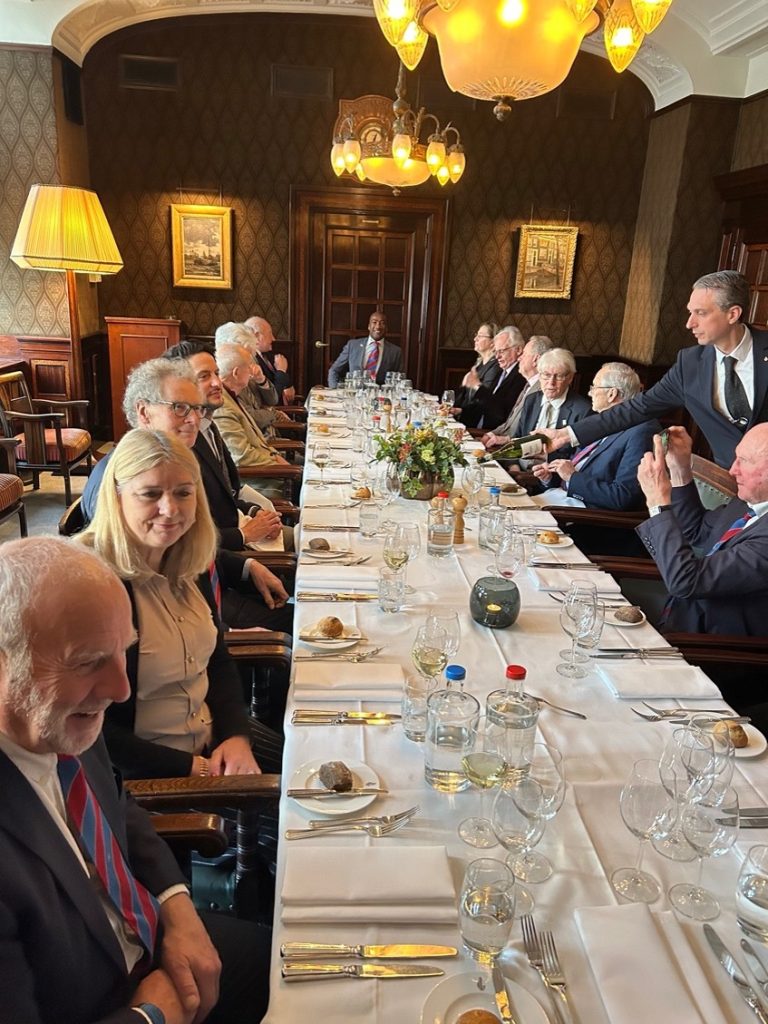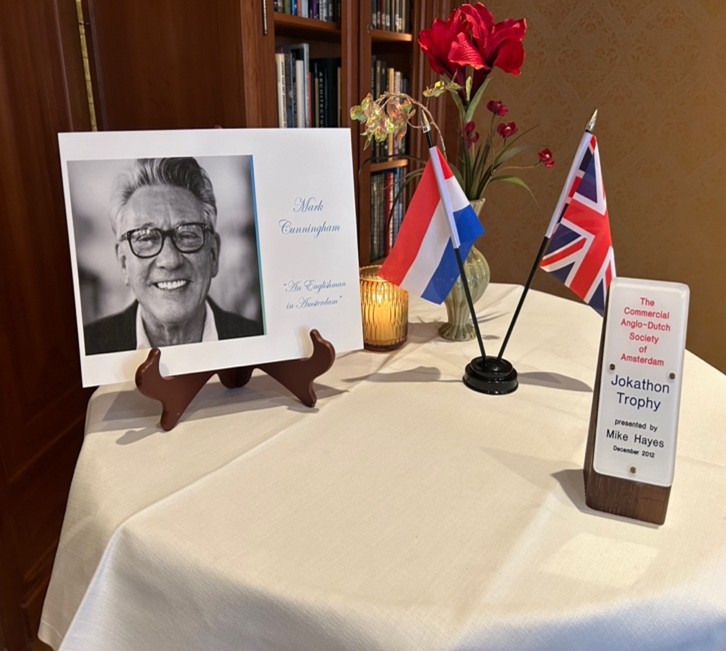First a word from the Amsterdam Front
By John Richardson | copywriter | artist | poet
As fellow Expats and comrades in arms, fighting the battle for acceptance on the Amsterdam Front, we all share that feeling of being far from home in an expat trench, bombarded with the stresses, miscommunication and sheer horror of learning to manage without pyjamas and mum; where one has to mix and mingle with strange variants of human life form: the expat hoi polloi, the great unwashed, and the recently showered. Mixed with the rag tag and bobtail of opinions and attitudes you thought were long dead. And as you peck your way up the cheese mountain of expat social order, you pat yourself on the back and comfort your soul by declaring that you’re “Doing one’s bit for Blighty”. Thank god we Brits have wit, humour and a pathological fear of other languages. So we make up our own. In our own versions of half-remembered university rag mags.
The flatland zeitgeist
Punch and Private Eye don’t quite capture the flatland zeitgeist quite like our own expat rags, home-grown in the market garden of our own fertile imaginings. Appallingly incapable of flattening any trench humour in favour of the constant bombardment of economic woes, we provide front line jocularity with the CADS Report and the Britsoc ZINE magazine: both blights on our linguistic heritage they are best summed up as “Fish and chips for the soul”.
The Wipers Times

 An Interesting parallel with these mumbling magalogues is The Wipers Times, a trench magazine published by soldiers fighting on the front lines of the First World War between early February 1916 and February 1918. The Wipers Times took its name for the army slang for Ypres, where it was first produced. It emulated Punch, but contained a more specific type of comedy relating exclusively to the soldiers on the Western Front.
An Interesting parallel with these mumbling magalogues is The Wipers Times, a trench magazine published by soldiers fighting on the front lines of the First World War between early February 1916 and February 1918. The Wipers Times took its name for the army slang for Ypres, where it was first produced. It emulated Punch, but contained a more specific type of comedy relating exclusively to the soldiers on the Western Front.
The Cathartic Role of Comedy
The practicalities of trench warfare had created a sudden and often uncomfortable closeness between classes and, therefore, The Wipers Times targeted a far wider audience class wise, despite its relatively limited circulation. Like Punch, the Wipers Times believed that comedy should be employed in a cathartic role against the tension, fear and grief caused by the fighting.
A day from the life of a “Sub” in Divisional Reserve” (By himself) 12.40am. Sleeping peacefully. 12.45 am Not sleeping peacefully. 12.50 awakened by a noise like a fog horn gone mad. 12.55. Realise someone has smelt gas, cannot find gas helmet or shirt. 1 am. Grope about for matches and candle – find to my discomfort several extra articles of furniture in the hut – curse volubly…. 1.15am Stumble round camp – rumour of “Stand To” – curse abominably. 1.30 am – Rumour squashed – gas alarm false – somebody’s clockwork motor-bike horn came unstuck – curse again – retire to bed.The paper itself was named after Tommy slang for Ypres itself.

 The title changed each time the division was moved to another part of the Line. It was produced by British soldiers from the 12th Battalion Sherwood Foresters (Nottingham & Derbyshire Regiment), 24th Division British Armies in France. In early 1916, the 12th Battalion was stationed in the front line at Ypres, Belgium and came across a printing press abandoned by a Belgian who had, in the words of the editor, “stood not on the order of his going, but gone.” A sergeant who had been a printer in peacetime salvaged it and printed a sample page. The paper itself was named after Tommy slang for Ypres itself.
The title changed each time the division was moved to another part of the Line. It was produced by British soldiers from the 12th Battalion Sherwood Foresters (Nottingham & Derbyshire Regiment), 24th Division British Armies in France. In early 1916, the 12th Battalion was stationed in the front line at Ypres, Belgium and came across a printing press abandoned by a Belgian who had, in the words of the editor, “stood not on the order of his going, but gone.” A sergeant who had been a printer in peacetime salvaged it and printed a sample page. The paper itself was named after Tommy slang for Ypres itself.
“Am I as offensive as I might be?”
The names of the staff involved in the paper are mostly unrecorded. The editor was Captain (later Lieutenant-Colonel) F. J. Roberts, the sub-editor was Lieutenant F. H. Pearson. A notable contributor to the paper was Artilleryman Gilbert Frankau. Alsoworthy of note are the engravings by E.J. Couzens: his portrait of a chinless platoon commander clutching his cane and wondering “Am I as offensive as I might be?” became the paper’s motif.
Most other contributors from the Division used pseudonyms: some now obscure; some intended to satirize contemporary newspaper pundits such as William Beach Thomas (of the Daily Mail) andHilaire Belloc; and some ironic, such as P.B.I. (Poor Bloody Infantry).
The paper consisted of poems, reflections, wry in-jokes and lampoons of the military situation the Division was in. In general the paper maintained a humorously ironic style that today can be recognised in satirical magazines such as Private Eye, Le Canard enchâiné and The Onion.
In 2013 the BBC broadcast a dramatisation, written by Ian Hislop and Nick Newman. Captain Fred Roberts was played by Ben Chaplin and Lt Jack Pearson by Julian Rhind-Tutt with Michael Palin andEmilia Fox in supporting roles.[1]
[youtube=http://www.youtube.com/watch?v=HH9Kvv56AHw&w=420&h=315]
Adverts
Cloth Hall. Ypres. Great Attraction This Week Messrs. INFANTRY, ARTILLERY & Co. Present their Screamingly Funny Farce, Entitled: "BLUFF" THIS FARCE PROMISES TO BE A GREAT SUCCESS AND A LONG RUN IS EXPECTED
Contents
 The covers of each issue were mock adverts, richly typeset, for war-related music-hall extravaganzas. A few samples (not richly typeset) are given below:
The covers of each issue were mock adverts, richly typeset, for war-related music-hall extravaganzas. A few samples (not richly typeset) are given below:
Shelling (whether from the enemy or one’s own side): is referred to all through the magazine. There are occasional small ads purportedly from Minnie (German trench mortar) to Flying Pig (British ditto) and various poems complaining about, or apologising for, incidents where British guns shelled their own lines.
Sex: the collections of pornography known to the Division as “The Munque Art Gallery” and “Kirschner’s” are frequently mentioned and occasionally advertised, as are the local brothels: the Fancies, the Poplar tree and Plug Street.
 Drink: the continued supply of rum and whiskey was a prime concern for all at the front. In one serial story, Narpoo Rum, a certain ‘Herlock Shomes’ spent five issues tracking rum-thieves round Hooge. Brief references also turn up to panic buying of supplies by unnamed individuals in the Division after rumours of a whisky drought.
Drink: the continued supply of rum and whiskey was a prime concern for all at the front. In one serial story, Narpoo Rum, a certain ‘Herlock Shomes’ spent five issues tracking rum-thieves round Hooge. Brief references also turn up to panic buying of supplies by unnamed individuals in the Division after rumours of a whisky drought.
Rats: these bred in enormous numbers in the trenches, chiefly fed on corpses but with an eye for anything left in a dugout. One poem in the paper describes how a rat and his wife opened a tin of sardines, ate the contents then sealed the tin back up for the author to find.
The reality of life in the trenches rarely breaks through what the editor termed the paper’s ‘hysterical hilarity’ but when it does, the gallows humour is clear and may appear callous to modern eyes. One example is a quote from an article in a British national newspaper about a bungled trench-raid, followed by a sharp comment from the editor of the Wipers Times:
“…They climbed into the trench and surprised the sentry, but unfortunately the revolver which was held to his head missed fire. Attempts were made to throttle him quietly, but he succeeded in raising the alarm, and had to be killed.” This we consider real bad luck for the sentry after the previous heroic efforts to keep him alive.Even the weather forecast wasn’t immune to it:
5 to 1 Mist 11 to 2 East Wind or Frost 8 to 1 Chlorine.
Poetry

 Much of the copy submitted by soldiers of the Division was poetry. Some was good, some was doggerel and occasional pieces were excellent: but not all was welcome. The fourth issue contained this notice from the editor:
Much of the copy submitted by soldiers of the Division was poetry. Some was good, some was doggerel and occasional pieces were excellent: but not all was welcome. The fourth issue contained this notice from the editor:
Sources:



